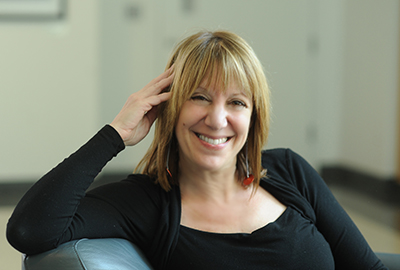Barbie Zelizer Named 2017-2018 Rutman Teaching Fellow

Barbie Zelizer, the Raymond Williams Professor of Communication at the Annenberg School for Communication at the University of Pennsylvania, has been named the 2017-2018 Rutman Teaching Fellow by the USC Shoah Foundation at the University of Southern California.
The Rutman Teaching Fellowship, awarded to one University of Pennsylvania professor each year, provides funding for a course that integrates into its curriculum USC Shoah Foundation’s Visual History Archive (VHA), which has more than 55,000 video testimonies of survivors and witnesses of genocide, including the Holocaust; the Rwandan, Armenian, Cambodian, and Guatemalan genocides; and the Nanjing Massacre in China.
In 2012, when Penn became the first institution in Pennsylvania to offer access to the VHA’s eyewitness testimonies, the Fellowship was created by a gift from Penn alumna Lori Rutman Fife in memory of her parents Henry and Sherry Rutman.
Zelizer will use her fellowship to teach a Ph.D. research seminar entitled “Mediating War and Genocide Through Visual Memory.” The seminar will take place at the end of the spring 2018 semester and continue into the summer, with a two-week immersive experience in Berlin. The course will be among the inaugural activities of Annenberg’s forthcoming Center for Media at Risk, conceived and directed by Zelizer.
Zelizer is offering the course in partnership with the Institute for the Study of Anti-Semitism at the Technical University of Berlin, which will host Penn students during their two-weeks in Germany. University of Berlin students will join in the class, which involves 12-18 class sessions and site visits through which the students will consider the mediated visual memory of war and genocide as it takes shape in museums, art installations, monuments, cinema, and other visual domains.
Zelizer has a deep body of research into the Holocaust, and into genocide more generally. Two of her 14 books include Visual Culture and the Holocaust (Rutgers University Press) and Remembering to Forget: Holocaust Memory Through the Camera’s Eye (University of Chicago Press).
“I am currently interested in considering the broad arc that stretches from the Holocaust, with its excess of visual documentation, to the Cold War and its absolute absence of visual documentation,” says Zelizer. “How does visual documentation impact how we come to grips with genocide, conflict, and war?”
She hopes her course – and access to the VHA – will help her students delve into this question. The Shoah Foundation will send representatives to Penn to train Zelizer’s students on best practices for using the VHA’s resources, and the students will be able to interact with the archives throughout the course.
“I want the students to learn what an archive looks like, to discover the mindset that drives archival documentation,” Zelizer says. “And access to the Visual History Archive – one of the premiere archives on genocide – will undoubtedly enrich their engagement with the course themes.”
Since 2007, Zelizer has been teaching immersive experience seminars around the globe through her role as Director of Annenberg’s Scholars Program in Culture and Communication. Past programs have taken place in Canada, Japan, Spain, South Africa, Puerto Rico, and numerous other nations around the globe.
In addition to teaching her course, Zelizer will deliver a lecture at USC on her research and her experience using the VHA.